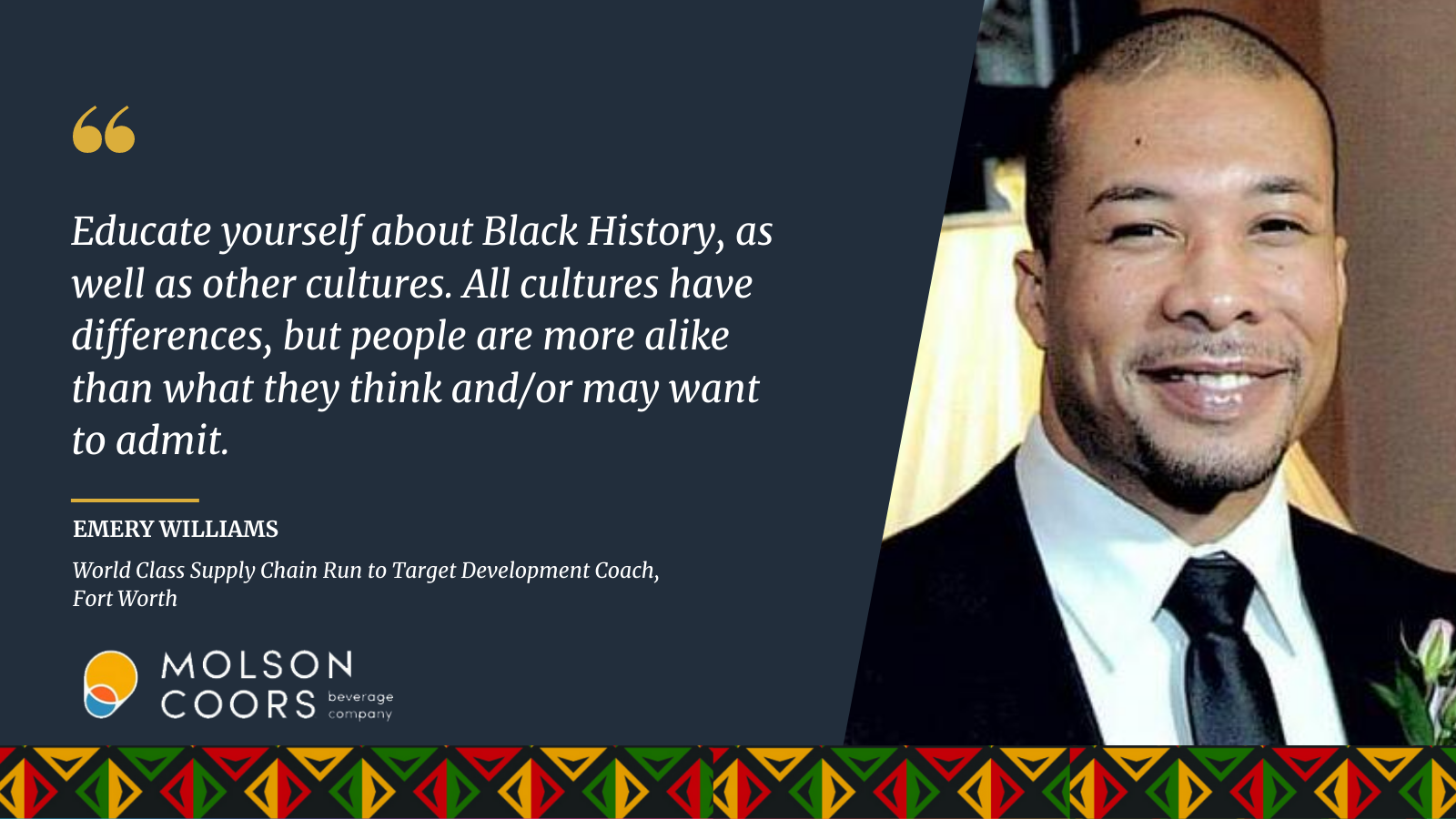When Emery Williams came to Molson Coors more than eight years ago, he was already a natural leader in his line of work. Having worked in the food and beverage manufacturing industry for 15 years, Williams had experience overseeing operations for bottle lines in all shapes and sizes.
But he was eager to advance and build new skills, leading him to attend a forum in Milwaukee organized by the company's African American Employee Network, one of Molson Coors' employee resource groups.
The experience resonated with him, presenting him with a number of personal and professional development opportunities over the years.
He has remained actively involved in the group's field chapter, and, after he moved to Fort Worth, he founded its own chapter, which has been rebranded to Black Employee Voices.
“The BEV Field Chapter strengthens our first value of putting people first by educating, developing and finding ways bring awareness to employees of Molson Coors Beverage Company,” Williams says. “They strengthen our values by communicating clear messages, building community with all cultures, teaching and leading others to learn, creating awareness of others and their feelings, valuing employees’ ideas and helping evolve an environment of accountability.”
Today, Williams is exercising leadership both within Black Employee Voices, which he co-leads, and at the brewery, where he serves as a development coach.
We asked Williams to share his thoughts on supporting Black voices, strengthening the Molson Coors culture and what others can do to educate themselves while recognizing Black History Month.
What does Black History Month mean to you?
Black History Month is a time to honor, acknowledge and celebrate accomplishments of Black people as well as struggles endured by ancestors to achieve equality, recognition and acceptance.
How do you celebrate and recognize Black History Month?
I believe in celebrating and recognizing Black History and other cultures all the time. When I do recognize and celebrate Black history during Black History Month, I read books, support Black businesses and watch movies and series pertaining to Black History.
How can others celebrate and honor Black History Month?
Others can support and honor Black History Month by learning about noteworthy Black people and contributions. Support Black-owned businesses and authors by making purchases. Donate and/or support charities involved with equity, equality and anti-racism. Attend Black History celebrations and virtual events. Volunteer, mentor and support Black people.
Celebrating diverse voices shouldn’t be limited to one month. How can people be strong allies throughout the entire year?
Educate yourself about Black history, as well as other cultures. All cultures have differences, but people are more alike than what they think and/or may want to admit.
My ethnicity estimate comes from several different world regions, including Nigeria, Benin and Togo, Mali, Cameroon, Congo, Sengal, Ivory Coast, Ghana and the Western Bantu and Eastern Bantu peoples. But it also includes places like Scotland, England, France, Northern Italy, Basque, Northern Africa, Portugal, Ireland, and Indigenous Americas-North.
Throughout your time at Molson Coors, how has the culture evolved? What can people do to improve the culture?
I believe the culture for the organization is slowly changing. With any change and attempt of change in culture, there is usually some type of resistance. I believe some changes have occurred because of individuals’ openness to change, servant leaders working in multiple areas of the organization and focusing on people and their development. In my opinion, I believe people can improve the culture by building community, developing people, listening, exhibiting empathy and acting on needs and concerns of the employees.
What is a book, movie and/or podcast you’d recommend people read/watch/listen to learn about Black History?
Books I recommend for Black History are “The Souls of Black Folk” by W.E.B. Du Bois and “The Unapologetic Guide to Black Mental Health” by Rheeda Walker.
The movies I recommend for Black History are “Harriet,” “Just Mercy,” “Selma,” “12 Years a Slave,” “The Great Debaters,” “A Raisin in the Sun,” “Glory Road,” “Judas and the Black Messiah,” “Remember the Titans,” “Hidden Figures,” “42,” “Red Tails,” “The Help,” and “Eve’s Bayou.”
Podcasts I recommend for Black History are “Black in Appalachia” and “Black History Year.”
What would you say to Black people who are interested in pursuing a career at Molson Coors?
When I am out in public and I have on Molson Coors Beverage Company swag, I am often approached about opportunities with the organization. The individuals are always people of color.
Compared to other organizations I’ve worked for, I believe Molson Coors Beverage Company does not view employees as just numbers. The organization genuinely cares about the people. The organization tries to provide promotional opportunities for minorities and people of color. The company strategy for investing in people is evident.

